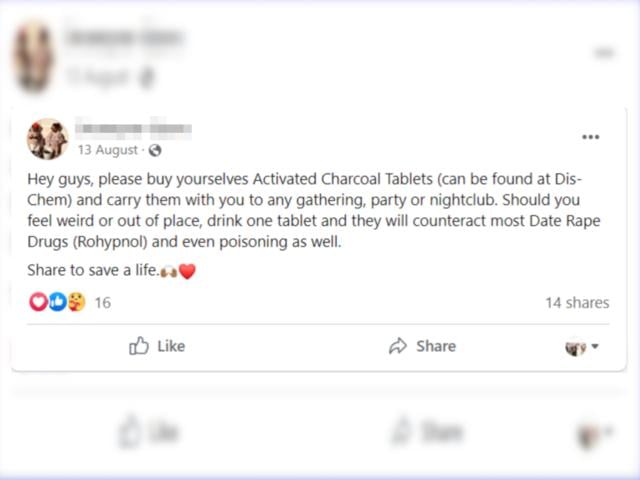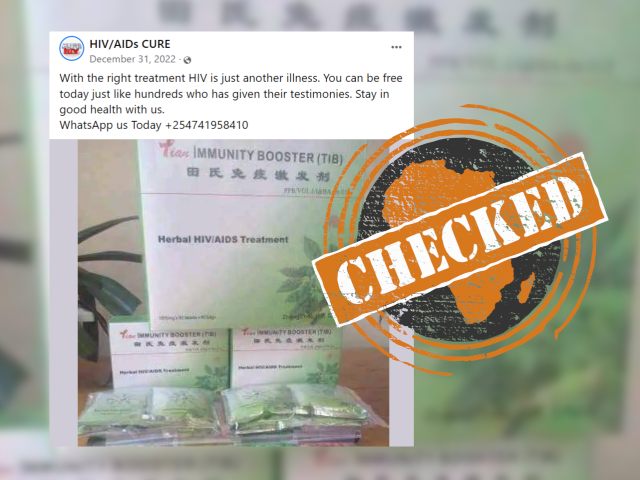-
The mind-boggling list of the benefits and medicinal properties of charcoal has been circulating on Facebook for at least six years. Its innocuous claim that charcoal can remove odours is correct, and the claim that charcoal can treat bloating mostly correct.
-
But experts told us that claims that charcoal can treat acne, whiten teeth, neutralise alcohol and remove contaminants from water are misleading. There are better options.
-
And the list makes several dangerous false claims. It’s not true that charcoal can heal a badly infected wound, remove bad cholesterol or treat stomach ulcers. Get professional medical help instead.
In recent years, the use of charcoal in products ranging from specialty foods to skin care products has become popular, with some describing it as a craze.
But with this has come several false claims about the health benefits of the carbon residue. For example, Africa Check recently debunked the popular claim that charcoal can counteract date rape drugs (spoiler alert – it can’t).
One post, which has been doing the rounds on Facebook since August 2017, lists 14 “benefits” of charcoal. It’s been shared more than 61,000 times and has over 19,000 likes.
“If you really need first aid, charcoal is something you need to have on you all the time,” it says. “You might not know this but it is one of the most medicinal products you can have at home due to its poison extraction ability.”
The post goes on to list several uses for charcoal, ranging from odour prevention and teeth whitening to cholesterol and ulcer treatment. You can even use it to “restore soup that went bad”, it claims.
You can simply use any charcoal you find in your home, the post says. “Activated charcoal is also useful but the above benefits are from using simple charcoal.”
The claim was repeated years later on other public group pages with thousands of followers.
But is charcoal really the cure-all these social media posts make it out to be? We checked.
Charcoal vs activated charcoal
Charcoal is the residue left when a material containing carbon is partially burned. For example, soot is a form of charcoal.
It’s a “highly absorbent material that holds chemical molecules, gas, and ions”, David Epstein, a private gastroenterologist and senior lecturer in the department of medicine at the University of Cape Town, told Africa Check.
Activated charcoal is modified by heat, which removes these bound chemicals and molecules, thereby increasing its surface area. This makes it more absorbent, Epstein explained.
“Medically produced activated charcoal is preferable if any charcoal is to be used,” he said.
Epstein said household charcoal should not be used because “dosing is not accurate and contamination possible”.
Mayo Clinic, a nonprofit academic medical centre in the US, says activated charcoal, while available without prescription, should be used under the supervision of a doctor, as some products contain sorbitol.
Sorbitol is a sweetener that also acts as a laxative and can cause severe diarrhoea and vomiting.
The Facebook posts claim that you can simply drop some charcoal where you suspect a bad smell in your home is coming from. They also claim that powdered charcoal can be used for body odour.
Several studies have found that activated charcoal, because it is porous, can absorb and control odours.
A 2021 study found that activated charcoal decreased the intensity of an odour in a container until it was no longer noticeable.
Other studies have concluded that activated charcoal can be used directly (topically) on the desired part of the body for body odour. It can be used in this way by people with skin diseases to reduce the odour associated with skin loss. This is because activated charcoal absorbs the chemicals that generate odour.
We therefore rate this claim as correct.
Making a thick solution of charcoal, smearing it on your body and leaving it on for hours can help with acne and other skin problems, according to the Facebook posts.
Charcoal is used widely in a range of skincare products to control oil and remove impurities.
Medical News Today, a UK-based medical information and news website, says skin cleansing products containing activated charcoal can help remove impurities and soak up excess oil. This in turn can clear blackheads and improve the appearance of acne and spots.
But Africa Check could not find any evidence that ordinary household charcoal can be used instead of clinically tested activated charcoal.
Products with activated charcoal are generally not harmful to use on the skin, but there are better, more researched options for people who have severe or cystic acne, such as topical and oral medication, says Mayo Clinic.
Activated charcoal can be abrasive
What about using charcoal to whiten your teeth? The Facebook posts say: “If you want to whiten your teeth, pay no attention to all these adverts on whitening chemicals and technology, just get yourself some charcoal.”
Again, activated charcoal has been associated with teeth whitening, but household charcoal would not have the same effect.
Activated charcoal in toothpaste is designed to whiten teeth by lifting stains, making them appear whiter.
But there are some risks. Colgate, a US oral hygiene brand, explains that when activated charcoal absorbs these stains, it can erode enamel because it is abrasive.
Activated charcoal toothpastes also tend to not contain fluoride, which is important for strengthening the teeth. This can lead to tooth cavities, says Colgate.
Instead, seek professional care from a dentist or dental hygienist for teeth whitening, advises the School of Dentistry at the University of Alberta in Canada.
The Facebook posts claims that if you have a hangover, you can simply take a charcoal solution or chew on charcoal to help detoxify the body and neutralise the alcohol. But this is also misleading.
The charcoal would have to be taken within the first hour of drinking for it to neutralise the alcohol, a 2019 study suggests.
And according to Mayo Clinic, using activated charcoal to neutralise poison should only be done in emergency situations.
But some studies have found that activated charcoal may not be enough to counteract the effects of pure alcohol poisoning.
Treatment for alcohol poisoning ranges from intravenous fluids to treat dehydration to pumping out the stomach contents with a tube.
Alcohol poisoning cannot be treated at home, Medical News Today says. Rather contact emergency services than try and neutralise the alcohol at home with household charcoal.
What effect would charcoal have on contaminated water?
Additional treatment processes required
We asked Colin Basch, the managing director of Process Water Technologies, a South African water purification company, about the claim.
Basch said that while “regular charcoal” could be used in water filtration, it was not as effective as “activated carbon”, another term for activated charcoal.
Activated charcoal has replaced ordinary charcoal in water purification systems because of its impressive adsorbent ability.
Although both regular and activated charcoal could remove some water contaminants, Basch said, “they do not remove all contaminants and are therefore used in conjunction with other treatment processes”.
Basch told Africa Check that activated carbon was effective in water treatment against tastes, odours, chlorine, detergents, radioactive gas, some artificial organic chemicals, and volatile organic chemicals such as paint thinners.
But “activated carbon is not effective against microbial contamination such as coliform bacteria and viruses, and heavy metals”, Basch said.
Coliform bacteria are rod-shaped microorganisms found in the intestinal tracts of animals and people. When found in water, it can indicate that the water has been contaminated with disease-causing organisms or faeces.
Basch said that additional treatment processes and disinfection were therefore required to effectively treat contaminated water and make it suitable for human consumption.
“Regular charcoal is best left for art, odour removal and cooking.”
We therefore rate this claim as misleading.
“If you ate or drank something and feel bloated, charcoal is the best solution to get rid of the bloating,” the Facebook posts read.
Dr Peter Barrow, a consultant gastroenterologist at the Wits Donald Gordon Medical Centre, told Africa Check that activated charcoal could be used as a treatment for bloating.
“There is some evidence for this from some old trials,” he said. He pointed us to a 1981 study on taking activated charcoal by mouth.
It shows that activated charcoal, when taken under medical supervision, can help to control gas and therefore help with bloating.
But it’s important to note that there are many causes of bloating, so charcoal isn’t a one-size-fits-all solution.
Epstein told Africa Check that a common cause of abdominal bloating is irritable bowel syndrome (IBS), a long-term digestive condition.
“Part of the cause of bloating experienced in people with IBS is excessive gas. It is believed that by using activated charcoal this excess gas would be absorbed thereby reducing the amount of bloating.”
But activated charcoal could also cause constipation, Epstein said, so it wouldn’t be the treatment of choice for someone who has IBS with constipation.
“Activated charcoal can be used if excessive gas is a problem but with advice on its side effects,” Epstein said.
There are other options that can help with stomach bloating, such as regular exercise and medication, says the National Health Service (NHS), the UK’s public health system.
We therefore rate this claim as mostly correct.
The Facebook posts have this advice when a wound has become infected to the point of amputation: “Don’t stress over it, get a large amount of charcoal powder and pour it on the wound.” The charcoal will extract “all the poison from the wound”.
This advice is dangerous.
“I have never encountered a situation where activated charcoal is applied directly to a wound,” John Tilley, a specialist physician at the Wits Donald Gordon Medical Centre, told Africa Check.
Activated charcoal dressings were used to treat some wounds, Tilley said. They look like tea bags, come in various sizes and are used to soak up foul-smelling fluid, caused by bacteria, from the wound.
“However, even in this situation, the practice has likely been replaced by negative pressure dressings.” These draw fluid and infection out of a wound so it can heal more quickly.
“Placing activated charcoal directly on a wound is not a good idea,” Tilley said. “It’s likely very difficult to get it off.”
Relying on charcoal alone to heal a wound could be dangerous. Untreated, severely infected wounds can lead to sepsis, a life-threatening medical emergency. Sepsis occurs when the body does not respond properly to an infection, says the Mayo Clinic.
We rate this claim as incorrect.
The Facebook posts claim that taking charcoal with water or chewing pieces of it can “eliminate bad cholesterol” and treat stomach ulcers.
But what do the experts say?
The US Centers for Disease Control describes cholesterol as a fat-like substance found in your blood and made by your liver. It is essential for good health because it helps your body to perform important tasks such as digesting fatty foods.
But having high levels of bad cholesterol, called low-density lipoprotein cholesterol, can cause plaque to build up in the arteries. This puts people at risk of heart attack and stroke, according to Johns Hopkins University, a private research university in the US.
The theory behind the claim could be that taking the charcoal could prevent recirculation of cholesterol to reduce the cholesterol level, Epstein told Africa Check. This was because cholesterol circulated from the liver to the gut and then back to the liver, he said.
“There is some scientific evidence to show that this works,” Epstein said, “but using charcoal would be a very unpalatable, obsolete and impracticable way of treating high cholesterol.”
Epstein said people with high cholesterol levels should talk to their doctor about treatment and lifestyle changes. Treatment of high cholesterol ranges from exercise and a healthy diet to medication.
But what about treating ulcers?
‘Definitely not in combination with other meds’
According to the NHS, stomach ulcers are open sores that develop either on the lining of the stomach or in a part of the intestine called the duodenum.
The most common causes of stomach ulcers are long-term use of high doses of anti-inflammatory medicines or an infection with H pylori bacteria, explains the National Institute of Diabetes and Digestive and Kidney Diseases, part of the US National Institutes of Health.
H pylori, or Helicobacter pylori, known as H Pylori, is a bacterium that infects the stomach.
“I would not recommend using charcoal as a treatment for ulcers,” Barrow told Africa Check.
“I think what they are indirectly referring to is that activated charcoal may have some antibacterial effects and as such may slow replication of H pylori (which is the major cause of gastric ulcers).”
But Barrow said it was wrong to say activated charcoal could treat ulcers. “Definitely not in combination with other drugs as it may actually reduce absorption of the drugs we normally use to treat ulcers,” he said.
This claim is incorrect.





Add new comment